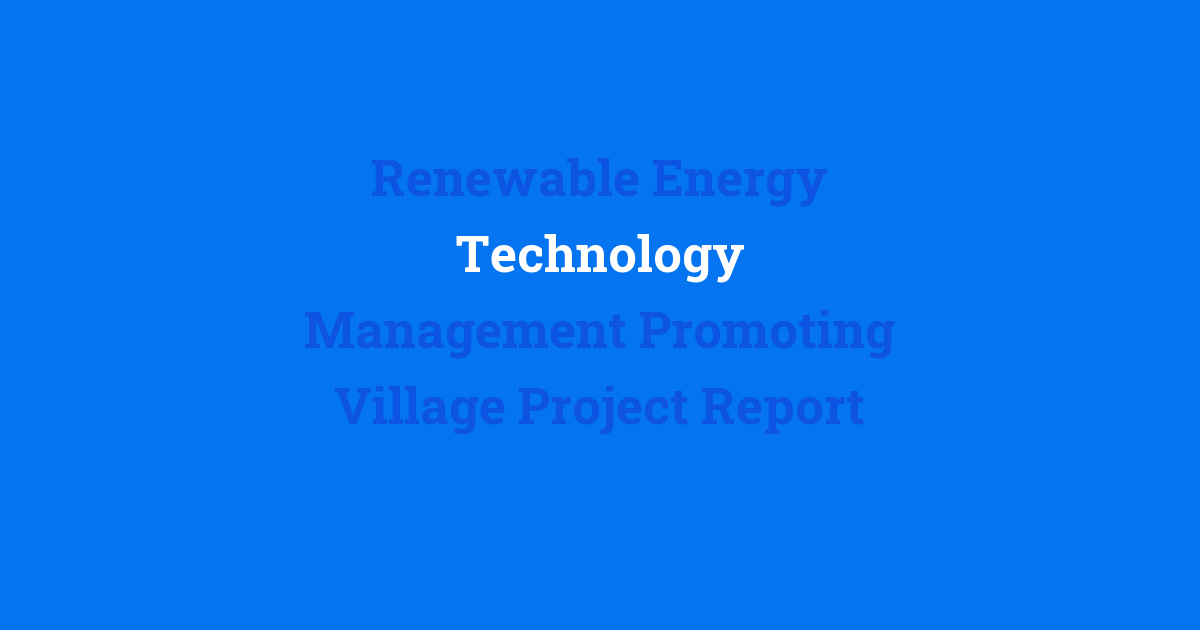Report on the management of renewable energy technology in village projects.
Introduction
In today’s world, the need for renewable energy technology has become increasingly important. With the growing concerns over climate change and the depletion of natural resources, it is crucial to shift towards sustainable energy sources. In this project report, we will be discussing the implementation of renewable energy technology management in promoting village development.
Problem Statement
In many villages in India, there is a lack of access to reliable and affordable energy sources. This hinders the overall development of the village and its residents. The reliance on traditional sources of energy such as kerosene lamps and wood for cooking not only has a negative impact on the environment but also poses health hazards to the people living in these villages. Therefore, there is a need to introduce renewable energy technology in these villages to address these issues and promote sustainable development.
Existing System
The current energy system in many villages relies heavily on non-renewable sources such as fossil fuels. This not only contributes to greenhouse gas emissions but also puts a strain on the limited natural resources. The lack of infrastructure for renewable energy technologies further complicates the situation, making it difficult for villages to transition to cleaner sources of energy.
Disadvantages
There are several disadvantages to relying on traditional energy sources in villages. Firstly, the cost of these energy sources is often high, making it difficult for villagers to afford them. Additionally, these sources are not sustainable in the long run and contribute to environmental degradation. The health implications of using these sources, such as indoor air pollution from cooking with wood, further highlight the need for a shift towards renewable energy technologies.
Proposed System
To address these challenges, we propose the implementation of renewable energy technology management in promoting village development. This system will involve the installation of solar panels, biogas plants, and wind turbines to generate clean and sustainable energy for the village. By harnessing these renewable energy sources, villages can reduce their reliance on fossil fuels and improve their overall quality of life.
Advantages
There are numerous advantages to implementing renewable energy technology in villages. Firstly, it provides a reliable and sustainable source of energy that is not dependent on dwindling natural resources. This can help reduce energy costs for villagers and improve their overall standard of living. Additionally, renewable energy technologies are environmentally friendly and help to mitigate the impacts of climate change. By promoting village development through renewable energy technology management, we can create a more sustainable future for all.
Features
The proposed system will feature the installation of solar panels on rooftops to harness the power of the sun and generate electricity. Additionally, biogas plants will be set up to convert organic waste into biogas for cooking and heating purposes. Wind turbines will also be installed to capture the kinetic energy of the wind and generate electricity. These features will work together to create a sustainable and reliable source of energy for the village.
Conclusion
In conclusion, the implementation of renewable energy technology management in promoting village development is crucial for addressing the energy needs of rural communities in India. By transitioning to clean and sustainable sources of energy, villages can improve their quality of life, reduce their carbon footprint, and contribute to a more sustainable future for all. It is imperative that we take action now to promote the use of renewable energy technologies in villages and pave the way for a greener and more sustainable world.

